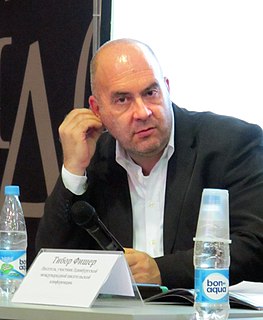A Quote by Charles Duhigg
After World War I, while France and other Allies were building military defenses modeled on trench warfare, German commanders were shaping a nimble fighting force.
Related Quotes
The darkest days in my life after the war, after the war, was when I discovered that the ... most of the members and commanders of the Einsatz group that were doing the killings, not even in gas chambers, but killing with machine guns, had college degrees from German universities and PhD's and MD's. Couldn't believe it.
I want the marginality to come into the center. This is the thing I was conscious of growing up, when I later lived in England. I saw all these war movies that came out shortly after the war, and they were all about the war being fought by Englishmen or Americans, there were no other "allies" in it - from India or Australia, etc.
You see that even the enemy did not dare to declare war against us till they had seized our generals, for they were sensible that, while we had commanders and yielded obedience to them, we were able to conquer them; but, having seized our commanders, they concluded that we should, from a want of command and discipline, be destroyed.
Saving Italy is an astonishing account of a little known American effort to save Italy’s vast store of priceless monuments and art during World War II. While American warriors were fighting the length of the country, other Americans were courageously working alongside to preserve the irreplaceable best of Italy’s culture. Read it and be proud of those who were on their own front lines of a cruel war.
The Second World War had a precipitating effect in that it discredited the empires, as well as bankrupting them. Not only could you no longer, if you were a colonial subject of France in Africa, look to France as a model of power and influence and civility after what had happened in the war. Nor could the French any longer afford to run their empire. And nor could the British, although they were not discredited in the way that the French were.
In France those absurd perversions of the art of war which covered themselves under the name of chivalry were more omnipotent than in any other country of Europe. The strength of the armies of Philip and John of Valois was composed of a fiery and undisciplined aristocracy which imagined itself to be the most efficient military force in the world, but which was in reality little removed from an armed mob.
When you say that after World War I there was a pandemic that killed more people than the war itself, most will say: "Wait, are you kidding? I know World War I, but there was no World War 1.5, was there?" But people were traveling around after the war, and that meant the force of infection was much higher. And the problem is that the rate of travel back then was dramatically less than what we have nowadays.
I was born just after the end of World War II, and with my friends in our little suburban backyards in New Jersey, we used to play war a lot. I don't know if boys still play war, they probably do, but we were thrusting ourselves into recent history and we were always fighting either the Nazis or the Japanese.
During my childhood and teenage years, everything I knew was at war. My mother and father were at war. My sister and I were at war. I was at war with my atypical nature, desperately trying to fit in and be normal. Even my genes were at war - the cool Swiss-German side versus the hot-headed Corsican.
Before September 11, we were fighting terrorism in our southwestern Philippines, and it was a lonely fight. However, we were able to contain it now in one island in that part of the Philippines. But after September 11, and after the creation of the global coalition against terrorism, now we have allies, and I believe now it will easier with allies.
It was with the last revolution and the coming of INGSOC (Inglish/English Socialism) that the latest High learnt how to keep their position permanently - by cultivating ignorance among the other classes and by constantly surveying them through the Thought Police. Part of this strategy included the maintenance of a state of continual warfare, which Goldstein discussed in the third chapter. The three major powers were not fighting this perpetual war for victory; they were fighting to keep a state of emergency always present as the surest guarantee of authoritarianism.

































